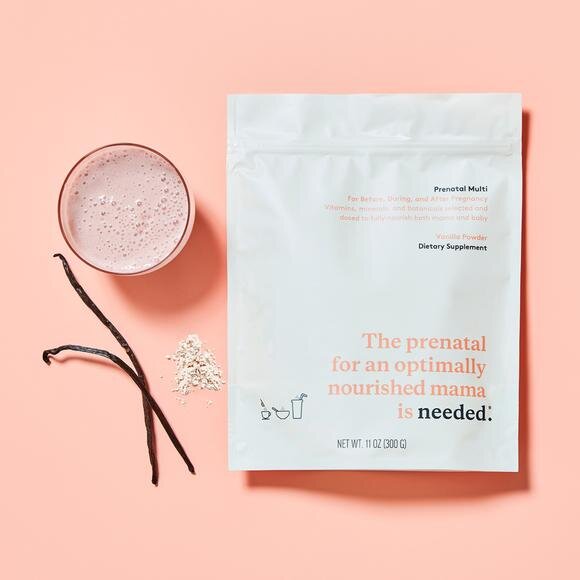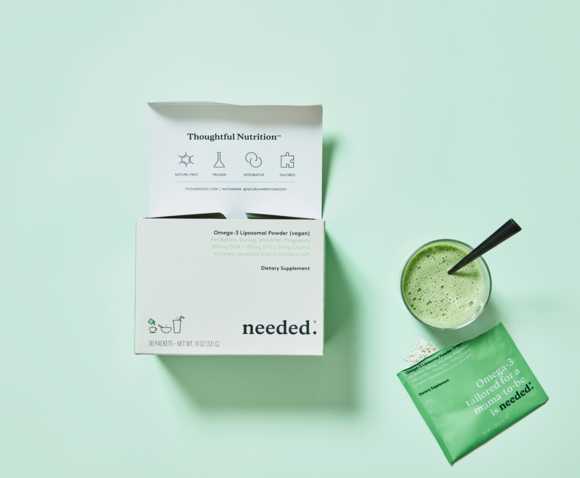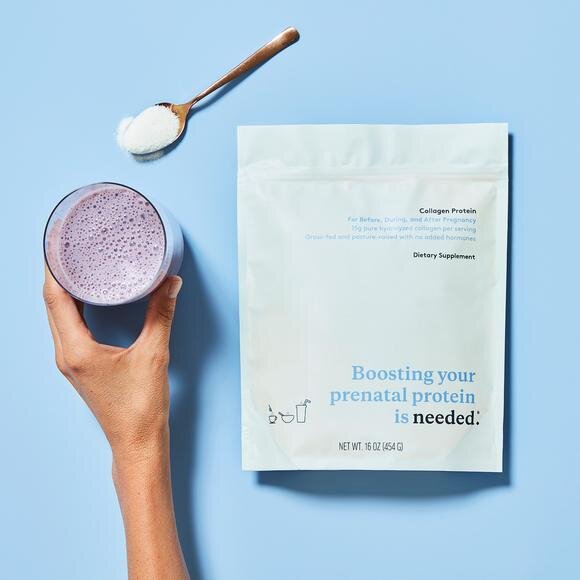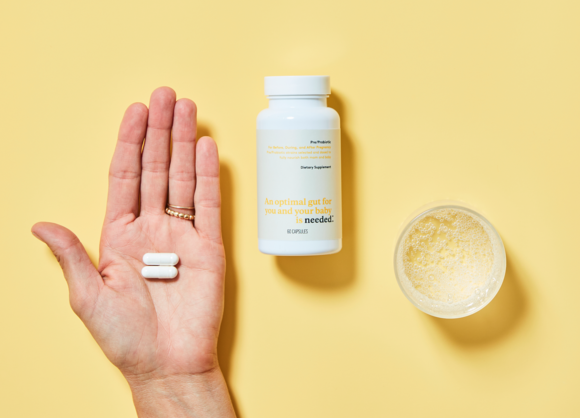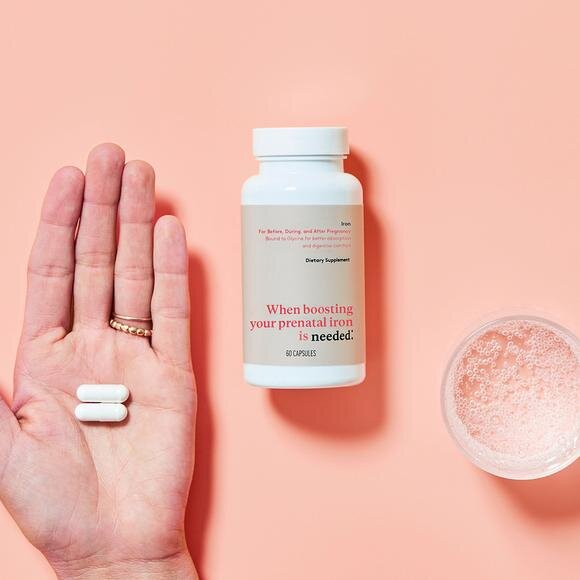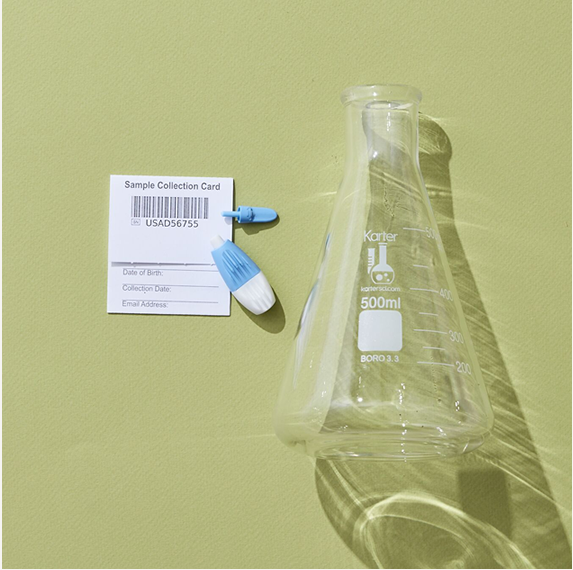Julie Sawaya and Ryan Woodbury are the co-founders of Needed, a nutrition company on a mission to empower women to understand and meet their needs before, during, and after pregnancy. Both lifelong nutrition enthusiasts, the two started Needed while at Stanford's graduate business school when they realized through nutrition testing that they were both very deficient in several key nutrients for pregnancy. They dug into the research and learned that up to 97% of women take a prenatal vitamin during pregnancy, and yet 95% have key nutrient deficiencies, leading to lifelong health consequences. That’s because most prenatals are designed to meet bare minimum needs—not to optimally nourish women.
Less is not more when it comes to prenatal nutrition. So Julie and Ryan got to work, redesigning the Prenatal Multi from the ground up in partnership with health practitioners who regularly test the nutrient levels of women who are trying to conceive, pregnant, or postpartum. Needed’s Complete Nutrition Plan launched in August 2020 and includes a Prenatal Multi, Omega-3 Liposomal Powder, Collagen Protein, and Pre/Probiotic, all specifically tailored to meet a mama and her baby’s needs.
Find them on instagram at @nourishmentisneeded
thisisneeded.com use code ANISA
Julie’s Nutrition Journey:
I discovered my passion for nutrition around my family dinner table. My dad (an MD) was diagnosed with diabetes when I was just 5 years old. His illness had a profound effect on me, leading me to research and advocate for the connection between our health and how we choose to nourish ourselves. My passion for nutrition only grew as I began my journey to motherhood and experienced firsthand how vital proper nourishment is for a healthy low-risk pregnancy, an optimal postpartum recovery, and baby’s foundation for lifelong health.
Ryan’s Nutrition Journey:
My interest in nutrition and health grew out of my interest in the environment. As a young girl in California, I started volunteering at a local aquarium, leading educational tours to teach kids about marine science and environmental advocacy. It was clear to me, even then, that our health as humans is directly connected to the health of our environment. Advocating for broader awareness of the human and environmental health connection has carried through much of my life. This was only heightened as I began my journey to motherhood, seeing how important a mama’s internal ecosystem, especially the microbiome, is for a healthy pregnancy and baby. I believe fundamentally that nourishing mamas will directly support nourished communities and a nourished planet.
Show Notes
Julie and Ryan started Needed 3 years ago when they learned through nutrient testing that they were hugely deficient in key prenatal nutrients, despite eating carefully. That means that, had they gotten pregnant at that point in time, they would have joined the more than 95% of women who begin pregnancy already deficient in key nutrients. This impacts everything from fertility, to hormone balance, to pregnancy viability, to how women feel during and after pregnancy, how high risk a pregnancy is (blood sugar and pressure), how women heal postpartum, and the lifelong health of baby.
They know from clinical research, and through partnering with health practitioners that these nutrient deficiencies often worsen throughout pregnancy and breastfeeding.
You might be wondering, but aren’t prenatal vitamins designed to fix or prevent this?
The answer is unfortunately, no. The vast majority of prenatals are designed to meet just the bare minimum needs, like avoiding scurvy, or other serious diseases. NOT to ensure that women reach and maintain optimal nutrient levels. They use poorly absorbed nutrient forms, and extremely inappropriate dosages. More on that later.
This conservative, “less is more” approach to prenatal and postnatal nutrition is totally backwards. Because pregnancy and breastfeeding are the most nutritionally demanding times in a woman’s life.
So prenatals aren’t cutting it. That’s a huge part of the problem. The other is that the women rely on their OBGYNs or prenatal vitamin recommendations receive almost zero nutritional training. They simply are not qualified to help women choose the right prenatal. Not to mention, the average OB visit is just 7 minutes long, leaving little time for a thorough discussion. Instead, well-meaning OBs very commonly say to “just take anything, it doesn’t matter”.
So, they set out to create products and education with REAL DIFFERENTIATION, based on the latest research as well as the clinical experience of informed doctors. Unlike most consumer companies that white label their vitamins, they’ve spent the last 3 years formulating our products from the group up, extensively studying and vetting every nutrient dosage, nutrient form, and source.
The result is their Prenatal Multi, the most comprehensive prenatal vitamin available in powder form. It also happens to be a totally delightful and easy-to-take vanilla powder that even nauseous mamas love. Find recipes to to include it in here.
As told by Ryan and Julie:
We’d like to walk you through a few of the nutrients included in our Prenatal Multi to show you how vastly different our Prenatal is from others. We include a total of 24 vitamins and minerals, all of which are very important, but here we highlight just a few to give you a sense for the research we’ve done.
Nutrients:
A note on RDA levels: There’s a gender health research gap that’s left us in the dark when it comes to women’s health. This is especially true during pregnancy, as nobody wants to run studies on pregnant women for fear of miscarriage or birth defects.
As a result, the government sets recommended nutrient levels for pregnant and expecting women at bare minimum nutrient levels--just enough to avoid things like scurvy (a severe deficiency of Vitamin C), but not nearly enough for higher-level functions of an optimal body. There is a big difference between avoiding a disease versus optimally nourishing.
We determine optimal dosages not solely by relying on the RDA. But, instead, by staying up to date on the latest nutrition research, and by integrating the clinical experience of those that regularly test mamas’ nutrient needs.
Choline: this is one of the nutrients where there actually is solid nutrition research behind the RDA level. 550mg, but we are the ONLY prenatal that actually meets the RDA. Most include none, or just 1/10th of what’s recommended. Choline is as important for baby’s brain and neural development as Folate (better known by its synthetic alternative, Folic Acid), so it’s very concerning how low most prenatals are dosing Choline. To put this in context, you’d need to consume 6 eggs/day every day to get enough through diet!
Folate: the RDA level is leading vitamin companies to overdo-it on nutrients like Folic Acid (which we always avoid in favor of the methyl form of Folate). Some supplement companies got the memo that methylfolate is better than Folic Acid, as 40-60% of mamas can’t process Folic Acid due to the MTHFR genetic variation. But, in doing so, they have started to dose too high. Too little Folate can affect maternal mood, but so too can an excess. We dose right around 900mcg, which is the “goldilocks” just right amount.
Magnesium, Calcium and other minerals -- most prenatals are missing or seriously lacking in proper forms and dosages of minerals. The primary reason is that they are bulky nutrients, that are difficult to fit into a gummy, or a 1-2/day pill form. Our soil is very depleted of minerals, and thus our food is too. These minerals are vital to baby’s skeletal system and bone formation, among other things like regulating mama’s blood pressure.
B12: this is a great example of a nutrient where the RDA levels for pregnancy and breastfeeding are way way way off, by a factor of 70-100x. That’s a crazy degree of error! The result is that many mamas are excessively fatigued, and B12 is also linked to early pregnancy loss as it is vital to DNA synthesis.
Other Key Nutrients Mamas Are Missing/why we offer them in our Complete Plan
Summary:
Less is not more when it comes to prenatal nutrition. It starts with an upgraded prenatal vitamin to help mamas thrive, not just survive. Mamas do need more than just vitamins and minerals, so we offer a complete plan that wraps in the other key supplement needs.
Beyond products, we are really focused on empowering mamas with the information and access to experts that’s needed for an optimal pregnancy and beyond.
If you take away nothing else, we hope it’s the following:
i) be very skeptical of prenatal vitamins in gummy or “1 or 2 pills a day” form. There’s now a FAR better option (our vanilla powdered Prenatal Multi) for mamas that need an easy-to-take option.
ii) there's a lot of noise (and science marketing) in the prenatal space right now, make sure you are relying on the right experts, with rigorous nutrition training, to help you cut through it.
Resources discussed
At home Omega-3 RBC test kit
GBS reduction study: Ho M, Chang Y-Y, Chang W-C, et al. Oral Lactobacillus rhamnosus GR-1 and Lactobacillus reuteri RC-14 to reduce Group B Streptococcus colonization in pregnant women: A randomized controlled trial. Taiwanese Journal of Obstetrics and Gynecology. 2016;55(4):515-518.
The probiotic supplement was taken for an average of 20 days. At the time of admission to the hospital for delivery, a repeat screen for GBS was completed. Among the women who received probiotics, 43% tested negative for GBS compared to only 18% in the placebo group. Cited in post by Lily Nichols, RDN
Placenta: The Forgotten Chakra by Robin Lim- reference to midwife’s observation about differences in placentas of vegetarian compared to omnivorous women
Placental weight study: Placental weight and its ratio to birth weight in normal pregnancy at Songkhlanagarind. J Med Assoc Thai .2006 Feb;89(2):130-7.
Average size of a placenta being about 1-2 lb
Ebook with recipes to include Prenatal Multi and Collagen Protein powders.

